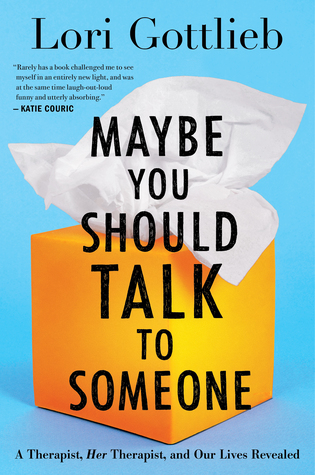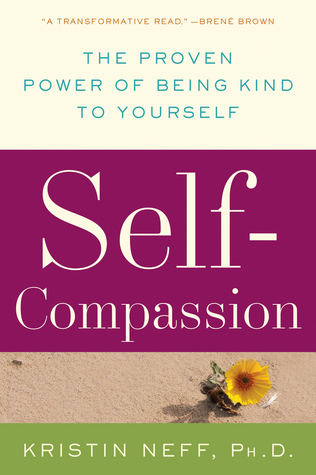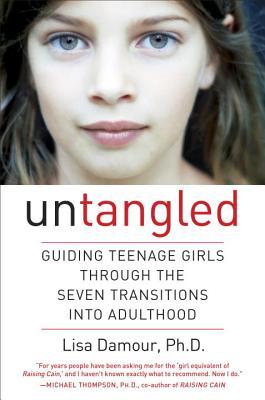Lori Gottlieb is a bestselling writer, psychotherapist, and author of the weekly "Dear Therapist" advice column for The Atlantic. Her new book, Maybe You Should Talk to Someone: A Therapist, Her Therapist, and Our Lives Revealed, arrives in U.S. bookstores on April 2. Be sure to add it to your Want to Read shelf.
Psychotherapists don't generally give advice, at least not directly. We're unlikely to say, "You should stop talking to your mother-in-law," or "Have a third child," or "Definitely take that job offer," or "If I were you, I'd file for divorce."
One of things that surprised me as a therapist was how often people wanted to be told what to do, as if I had the right answer or as if right and wrong answers existed for the bulk of choices people make in their daily lives.
Taped up next to my files is the word ultracrepidarianism, which means "the habit of giving opinions and advice on matters outside of one's knowledge or competence." It's a reminder to myself that as a therapist, I can come to understand people and help them sort out what they want to do, but I can't make their life choices for them. Most important, we want to support their independence. In other words, we want them to learn to trust themselves, to learn to make their own good choices.
That's not to say that I never give advice—it's just that it comes in the form of a clearer understanding of oneself, which leads to a clearer path forward. I do this in my weekly "Dear Therapist" column, of course, but I'll also recommend books in the therapy room that will help people to see themselves and their experiences through a different lens.
Here are a few of my favorite not-so-typical advice books:
"One of the most important steps in therapy is helping people take responsibility for their current predicaments, because once they realize that they can (and must) construct their own lives, they're free to generate change. Often, though, people carry around the belief that the majority of their problems are circumstantial or situational—which is to say, external. And if the problems are caused by everyone and everything else, by stuff out there, why should they bother to change themselves? Even if they decide to do things differently, won't the rest of the world still be the same? It's a reasonable argument, but that's not how life generally works. Because sometimes—more often than we tend to realize—those difficult people are us. In Thanks for the Feedback, Douglas Stone and Sheila Heen, show you how to hear feedback, how to give feedback, how to use feedback, and how to relate better to people both personally and professionally. If you often feel criticized—or are told that you seem critical—this is a must-read. You'll never see yourself the same way again—and that's a good thing."
"Before Cheryl Strayed became a household name, she wrote what might be called an existential-style advice column for The Rumpus. Like a cross between a therapist, preacher, confessor, and best friend, she answered readers' questions with personal revelations, anecdotes, tough love, optimism, and a generous arsenal of truth bombs. You may not share each readers' experience, but Strayed's answers speak to the universality of human experience in a way that will make you both laugh and cry in recognition: Ah, this, too, is me."
"Meg Jay is a psychotherapist who noticed that her young adult patients were in trouble. They were treating their 20s as if they didn't matter, as if "real life" started after age 30—only to be shocked when they found themselves unprepared for adulthood and wishing they'd paid more attention to their relationships, careers, and futures earlier on. Jay makes a compelling case for why the twenties matter, and offers a game plan for what twenty-somethings can do to set themselves up to achieve the fulfillment they're seeking. I recommend this to nearly every therapy patient I see in this age group—and sometimes also to their parents."
"If you were to transcribe the tapes that play in most people's heads, you'd think we were a species of toxic bullies—at least to ourselves. Kristin Neff wrote a groundbreaking book about our tendency to be unkind to ourselves, and what we can do to end the self-criticism and become more compassionate people. She makes an important distinction between self-compassion and self-esteem, and asks you to view yourself through a kinder lens, which is a lot harder than it sounds. Make sure you read this with a highlighter nearby."
"Therapists are well-versed in attachment theory—the ways in which early experiences inform our relationships later on. In Attached, Amir Levine and Rachel Heller clearly explain the attachment style patterns that people tend to fall into, and then provide a road map for how to break free from the ones that hold you back from having the kind of relationship you want. I recommend this to both singles and couples who want to stop getting tripped up in the same self-defeating cycles."
"The beauty of Lisa Damour's guide for parents of teen girls is that its advice is centered on the developmental transitions girls go through, which helps parents understand their daughters' behavior as developmentally 'normal' or, in some cases, less typical and meriting further intervention. Her suggestions are specific and easy-to-follow, but she doesn't promise that if you follow her advice, it'll all go smoothly. What she does offer is wise and often surprising insight into a teenager's inner life, and a warm, reassuring voice that, even on the page, is instantly calming."
"Now 87, Dr. Irvin Yalom is like the Oliver Sacks of psychotherapy, a professor emeritus at Stanford, and the author of several books that bring people not just into his therapy room, but also face-to-face with the human condition. All of his books are fascinating, but Love's Executioner is one my favorites because Yalom allows us to see not just his patients, but also himself—his flaws, his biases, and his own humanity. He's funny and real, his stories are riveting, and his patients stay with us long after the book has ended, because in a way, we are these people. And in helping them, Yalom shows us how we can get out of our own ways."
"Julie Yip-Williams was in her late thirties when she was diagnosed with colon cancer. In the four years from diagnosis to her death, she wrote this eye-opening and life-affirming memoir that was part advice to her young daughters, part a testament to resilience, and part an 'exhortation to the living' to make the most of what's right in front of them. The result will make you laugh, cry, hug your loved ones tighter, and examine the way you're living your life in an unvarnished way."
Lori Gottlieb's book Maybe You Should Talk to Someone: A Therapist, Her Therapist, and Our Lives Revealed will be available in the U.S. on April 2. Don't forget to add it to your Want to Read shelf. Be sure to also read more of our exclusive author interviews and get more great book recommendations.
posted by Cybil on March, 19
from Goodreads Blog https://ift.tt/2ugNYYN
via IFTTT










No comments:
Post a Comment